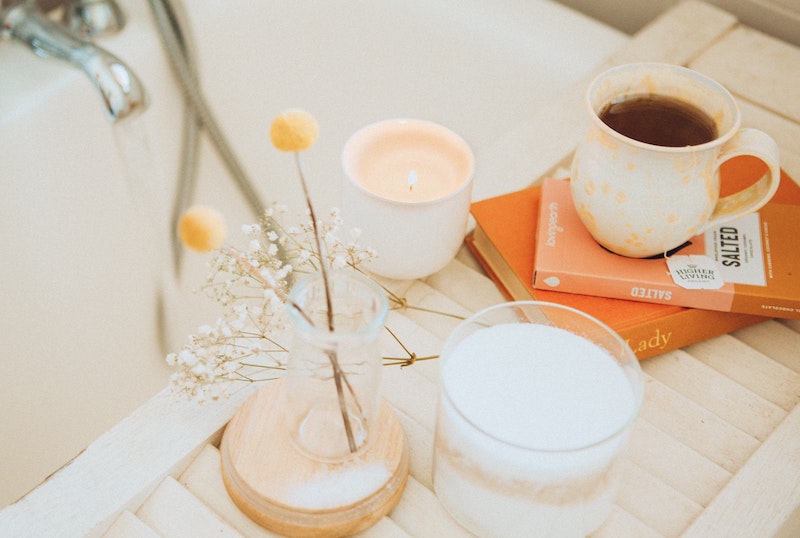
It’s all a lot right now, so it’s no wonder so many of my clients report feeling everything from moments of intense burnout to complete overwhelm. Sure, small doses of stress can propel us forward and help us to grow, but when it becomes chronic and all-consuming, it can affect everything from our physical health to our sleep.
As a mental health coach, it’s my job to help people begin to identify and implement moments of realistic self-care into their daily lives. You saw that I said realistic, right? Yeah, I’m not talking about flying off to meditation retreats or investing in luxury skin serums. Self-care isn’t about buying the latest gadget from social media ads or taking days away from real-life. It’s about doing small, nurturing things for ourselves, in the midst of the real-life chaos, because we both need and deserve it.
I’m a mom, household chef, one-woman cleaning crew, and employee, so I know how crucial self-care is and how hard it can be to actually make time for it. Most days, it seems that I’m so busy taking care of everyone around me that I barely have a second for myself. Sound familiar?
In an ideal world, self-care would be woven into our daily lives. But in reality, most of us don’t have a blueprint for self-care and end up feeling guilty when we do actually take time for ourselves. Of course, it doesn’t help that we live in a productivity-obsessed culture.
Busting those self-care myths
While self-care is unique to everyone, it can help to start with identifying what self-care is and what it isn’t. You may be pleasantly surprised to find that it’s actually more accessible and achievable than you thought. I’ve decided to myth-bust all things surrounding self-care so that you can bring a little bit of it into your messiest, most imperfect days.
Myth: Self-care is just a shower
Activities like using the bathroom in peace, taking a shower, putting “real” clothes on, or having a warm cup of coffee can feel like huge wins, but they aren’t necessarily the complete self-care story.
For the most part, these are our basic hygiene rituals and routines that have somehow become the poster children of the self-care movement. Taking a shower or a bath can serve as a temporary reprieve, but you may need more.
Self-care, by definition, is the process of taking care of oneself with behaviors that promote health and holistic wellness through active management to prevent and treat illness. So, with that in mind, it makes sense that what’s really needed are things like support from those around us, space to nurture ourselves, and permission to do it all imperfectly.
While an uninterrupted shower feels so good, I encourage you to continue to advocate for even more moments for yourself and support from your community when the stress starts to creep in.
Myth: Self-care is happy hour
As a mom, I’ve noticed that “mommy needs a break” is synonymous with “mommy needs a glass of wine.” And hey, I’m a fan of a cold beer on a hot day or a glass of wine over a chat with a friend, but it’s not my best solution to stress.
This might feel like a buzzkill, but it can actually make things worse. Often alcohol, sweets, and other indulgences are promoted as self-care. While I’m not here to label these things as “bad,” it’s important to be mindful of the intentions behind your self-care choices and to be careful not to become dependent on the tools that have become practices of self-care so that there is a sense of self-control.
The ultimate goal of practicing self-care is to develop skills and resilience so that you’re better equipped to handle the curve balls of life. If a common go to for self-care is an escape route, then self-care isn’t actually happening – avoidance is. Instead of tuning out, try tuning into your body. What do you really need? A hug? A mental health day? A helping hand? To ignore that pile of laundry or sink full of dishes and just go to bed?
Myth: Self-care is (only) relaxation
Often self-care is depicted through images of a relaxing day at the spa or binge watching the latest series, but I want to challenge that thinking. While I’m a strong advocate for listening to what your body needs and responding to that, relaxation isn’t designed to be the sole form of self-care.
Self-care can be, and is often encouraged by the experts, to be practiced actively. That means making moves to nurture our bodies inside and out. Things like making time for daily movement, ensuring you’re being mindful of your spending habits, eating nutritionally satiating foods each day, and setting boundaries around your emotional and mental energy are all forms of active self-care. When you find yourself doing something, you’re pulling yourself out of the stress response (freezing) and into tangible steps to prioritize your well-being.
Myth: Self-care is selfish
It can take some time to convince ourselves that self-care isn’t selfish because of the unspoken pressure to do it all. In coaching sessions, I often ask the question, “By saying no to _____, what are you saying yes to?” And the answer often surprises them.
They realize that by saying no to so many extra tasks, responsibilities, or things that aren’t theirs to carry, they’re allowing themselves to connect with their loved ones, creating boundaries, and are releasing some of the self-placed pressure from their lives. I’ve found in my own life that when I advocate for a much-needed day off, I’m able to give the best of myself in all areas, rather than just whatever is left of me.
Myth: Self-care is a one-and-done
It can be a common misconception that you need just one day of self-care and you’ll be all reset, recharged, and ready to face the world. That’s not completely true. It takes a daily commitment for self-care to have a true impact on well-being. Something I commonly hear is, “I don’t have time”. I completely feel you, and every situation is different, but that too is often a misconception.
When you look at your schedule, the things you’re taking on or expecting of yourself, you’ll likely find pockets of time that could be devoted to self-care. What I do is make a time-table of my week and fill in the things that are urgent and must-do responsibilities, such as work or caring for my small children. Anything that falls outside of that category is a choice and I can often manipulate how that fits into my schedule.
So, if I notice I’m filling my daily schedule with things like scrolling social media or gluing together completed puzzles from 1995, then I’m not really prioritizing things that are nurturing my soul. After I get a good, honest look at where my time and energy are going, I can decide how I want my schedule to look.
Maybe it’s incorporating a 15-minute moment of movement during the day or asking someone else to handle a household chore when my schedule is packed. When our lives are so busy, it can make all the difference to ensure that your schedule supports the lifestyle and wellness you need.
Self-care is something each one of us deserves no matter age, race, employment status, or gender. It starts with making small changes that will ultimately have a big effect on your overall well-being, leading to a more fulfilling, joyful life. So the next time you’re feeling overwhelmed, see how you can realistically carve out time and space for self-care. We’re here to support you along the way.

By Natalie Septer, Mental Health Coach
As a Sanvello Coach, Natalie is passionate about supporting people as they navigate life — in the good times and the bad. Her role is to help enhance self-awareness and equip clients with the tools necessary to live their best life. When she’s not seeing clients, Natalie is a yoga instructor, a podcast aficionado, and a mom to three boys. For self-care, she loves to read, journal, and exercise.
